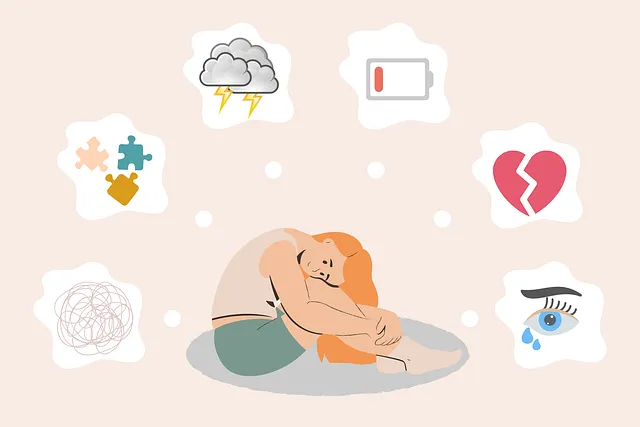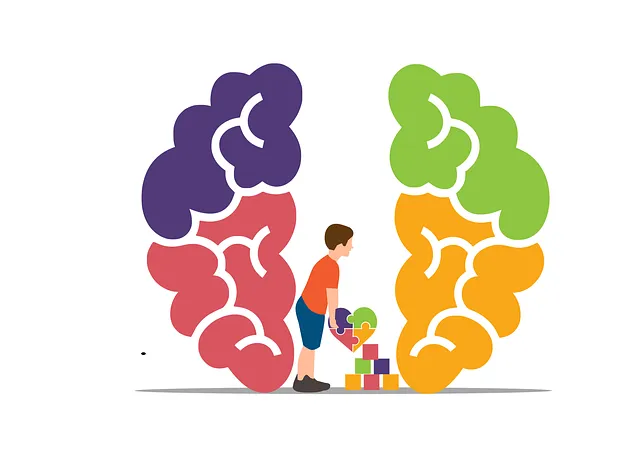The Highlands Ranch Kaiser Permanente psychiatry reviews emphasize resilience as a cornerstone of emotional well-being and mental health, promoting the RFM (Recovery, Flexibility, Mastery) model for building this asset. This approach aids in developing effective coping strategies, stress management skills, and adaptability to navigate challenges. Physical exercise is recognized as vital for psychiatric recovery, with regular activity significantly improving symptoms of depression, anxiety, and PTSD, as supported by the Highlands Ranch Kaiser Permanente psychiatry reviews. Mindfulness meditation and community outreach programs further enhance mental health through empathy-building and meaningful connections. Implementing resilience training requires a strategic approach integrating evidence-based practices in a safe, supportive environment. Overcoming barriers to exercise is addressed through flexible routines and crisis intervention. Success is measured using tools like Mental Health Education Programs Design and Mental Wellness Journaling Exercises, fostering a thriving community where physical activity is integral to overall well-being.
“Resilience, a cornerstone of mental well-being, is built through structured exercises, particularly relevant in today’s fast-paced world. This article delves into the concept of RFM (Resilience, Flexibility, and Mastery), exploring its significance in psychiatric recovery. Drawing insights from a comprehensive Kaiser Permanente Psychiatry Review based in Highlands Ranch, we examine the transformative power of exercise. Additionally, we provide practical strategies for implementing effective resilience training programs, addressing barriers to participation, and measuring success through patient outcomes.”
- Understanding RFM: An Overview for Resilience Building
- The Role of Exercise in Psychiatric Recovery: A Kaiser Permanente Psychiatry Review (Highlands Ranch)
- Implementing Effective Resilience Training Programs
- Strategies for Overcoming Barriers to Exercise Participation
- Measuring Success: Evaluating the Impact of RFM on Patient Outcomes
Understanding RFM: An Overview for Resilience Building

Resilience is a vital component of overall emotional well-being and mental wellness. Understanding RFM (Recovery, Flexibility, and Mastery) provides a framework for building this crucial asset. The Highlands Ranch Kaiser Permanente psychiatry reviews highlight the growing recognition of RFM as an effective approach to enhancing resilience in individuals facing various challenges. By focusing on these three dimensions, people can develop coping strategies that promote emotional well-being promotion techniques and stress management skills.
The RFM model encourages individuals to recover from setbacks, demonstrating flexibility in the face of adversity, and taking mastery over their thoughts and actions. This approach is particularly relevant in today’s fast-paced world where effective stress management has become essential. Mental wellness coaching programs development based on RFM can help people navigate life’s complexities, fostering a sense of control and adaptability, which are key to maintaining mental wellness.
The Role of Exercise in Psychiatric Recovery: A Kaiser Permanente Psychiatry Review (Highlands Ranch)

The role of physical exercise in psychiatric recovery has garnered significant attention from healthcare professionals, especially within institutions like Highlands Ranch Kaiser Permanente. Numerous studies have explored how regular activity can be a powerful tool for individuals navigating mental health challenges. The Highlands Ranch Kaiser Permanente psychiatry reviews consistently highlight the positive impact of exercise on improving symptoms associated with depression, anxiety, and post-traumatic stress disorder (PTSD). This is not merely a trend but a growing body of evidence that integrates physical well-being into comprehensive psychiatric care.
Beyond its therapeutic benefits, incorporating exercises like mindfulness meditation and community outreach programs can foster empathy building strategies within supportive environments. By engaging in these activities, individuals with mental health conditions can enhance their coping mechanisms, build resilience, and form meaningful connections—all essential elements for a holistic approach to mental health awareness.
Implementing Effective Resilience Training Programs

Implementing Effective Resilience Training Programs involves a strategic approach tailored to meet the unique needs of individuals within an organization or community. At Highlands Ranch Kaiser Permanente, psychiatry reviews highlight the growing importance of mental wellness initiatives, especially in stressful environments. Resilience training programs should be comprehensive, integrating evidence-based practices and techniques such as conflict resolution skills, mindfulness exercises, and stress management strategies. These tools empower participants to navigate challenges, foster positive relationships, and maintain emotional equilibrium.
The success of resilience building exercises relies on creating a safe and supportive learning environment. Incorporating interactive activities, group discussions, and real-life scenarios ensures engagement and promotes the exchange of experiences. By combining theoretical knowledge with practical applications, mental wellness can be enhanced, enabling individuals to cope effectively during difficult times. Additionally, aligning these programs with the latest research in Mental Wellness Podcast Series Production ensures that participants gain access to up-to-date information and innovative techniques, ultimately contributing to a more resilient and thriving community.
Strategies for Overcoming Barriers to Exercise Participation

Overcoming barriers to exercise participation is a crucial step in implementing RFM and resilience-building exercises. Many individuals face challenges that deter them from engaging in regular physical activity, such as time constraints, lack of motivation, or even fear of injury. At Highlands Ranch Kaiser Permanente, psychiatry reviews highlight the significant role mental health plays in an individual’s ability to maintain an active lifestyle. Crisis intervention guidance can be tailored to address these barriers by offering flexible exercise routines and encouraging small, manageable steps towards a more active life.
Mental health education programs designed with a focus on resilience-building can significantly enhance participation rates. These programs aim to destigmatize mental wellness and provide practical tools for managing stress and anxiety through physical activity. Additionally, producing a Mental Wellness Podcast Series can offer accessible guidance and inspiration, catering to diverse preferences and schedules. By integrating these strategies, communities like Highlands Ranch Kaiser Permanente can foster an environment where exercise becomes an integral part of overall well-being.
Measuring Success: Evaluating the Impact of RFM on Patient Outcomes

Measuring success is a vital aspect of evaluating the effectiveness of RFM (Resilience, Flexibility, and Mindfulness) programs in healthcare settings, particularly within Highlands Ranch Kaiser Permanente psychiatry reviews. The impact on patient outcomes can be profound when implementing evidence-based practices such as Mental Health Education Programs Design, which go beyond traditional treatment methods. By incorporating Mental Wellness Journaling Exercise Guidance, patients are equipped with tools to navigate life’s challenges and improve their overall well-being.
Compassion cultivation practices have proven to enhance resilience, fostering a sense of belonging and encouraging self-care. These initiatives enable individuals to not only manage symptoms but also to thrive in various aspects of their lives. Through regular assessment and patient feedback, healthcare providers can gauge the success of RFM implementation, ensuring that these programs remain adaptable and responsive to individual needs.
The implementation of RFM (Resilience, Fitness, and Mental Health) programs, as supported by the comprehensive psychiatric reviews from Highlands Ranch Kaiser Permanente, offers a promising approach to enhancing patient outcomes. By integrating resilience-building exercises into treatment plans, healthcare providers can empower individuals to navigate life’s challenges more effectively. Overcoming barriers to exercise participation through tailored strategies ensures that these programs are accessible and engaging for diverse patient populations. As highlighted in this article, measuring the impact of RFM on patient outcomes is crucial for refining and optimizing these initiatives, ultimately contributing to improved mental health and well-being within the community.






